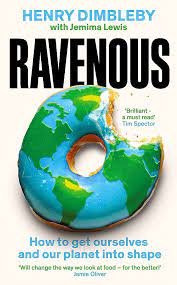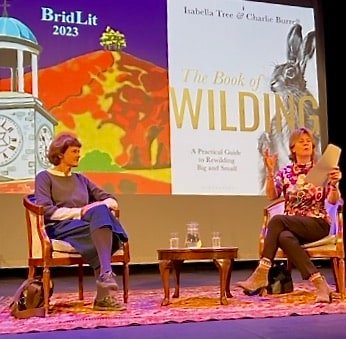The Electric Palace in Bridport was packed. The Bridport Literary Festival or Bridlit had managed to get Isabella Tree to come and talk to me in front of the 400 people who were able to get tickets. The focus was the newly published ‘The Book of Wilding‘ which is an easy-to-read manual on what can be done on a big and small scale.
When I emailed Isabella before the event to arrange a pre-chat discussion she responded ‘Let’s just wing it’. It was great fun. Of course, I’d made some notes about the topics we were going to discuss but Isabella hadn’t been pre-warned about what I would cover. And she was brilliant!

The audience was most shocked towards the end when she said that she and her husband, Charlie Burrell, dumped 400 tonnes of crushed brick and concrete on their croquet lawn, at Knepp – now planted with over 900 species of dry-loving plants from Australia, the US, South Africa and the Mediterranean, interspersed with native wildflowers. There were gasps! But she explained, they only played croquet a few times a year – and during lock-down it dawned on them that whilst they had wilded their 3,500-acre estate in Sussex, they hadn’t taken the same approach with their own garden. Now it’s part of their amazing story.
A few weeks ago I went to the premier of the film Wilding – see the blog I’ve written about it. It hasn’t been released yet, but when it is I recommend going to see it. One of the stories in the film was about the early days of rewilding on their estate. Charlie recounted making a presentation to local farmers about how they had transformed their land from monoculture arable fields to a thriving, humming landscape full of wildlife. The photos below show how the land has changed from when it started. Their agricultural neighbours were not impressed. They were apparently horrified by the suggestion that they might take the same approach by wilding their own land.

A few weeks ago I went to the premier of the film Wilding – see the blog I’ve written about it. It hasn’t been released yet, but when it is I recommend going to see it. One of the stories in the film was about the early days of rewilding on their estate. Charlie recounted making a presentation to local farmers about how they had transformed their land from monoculture arable fields to a thriving, humming landscape full of wildlife. The photos below show how the land has changed from when it started. Their agricultural neighbours were not impressed. They were apparently horrified by the suggestion that they might take the same approach by wilding their own land.
I’m often challenged about the potential conflict with wilding vs food production. Isabella tackles this issue in several ways. First farming on their land produced low yields, which meant that it was uncompetitive compared to prime agricultural land. There’s a lot of marginal land like that in the UK which is being thrashed to oblivion – with poor soil and low productivity. Another perspective is to look at the bigger issues around food today, for example, the massive amount of food waste at a global level. Apparently, about 30-40% of wasted food is fit for human consumption. And, the fact that diets in the industrialised world have become incredibly over-processed, unhealthy, and unsustainable.
When asked what she would do about food production if she were in government Isabella said that she would encourage regenerative farming on productive land with no ploughing – and promote wilding on the rest. Apparently, encouraging wildlife in field margins actually increases crop yields, so it’s not simply an either/or option.
An interesting point of conflict between Isabella and some environmentalists such as George Monbiot is that she is a great advocate of having farm animals – albeit in very low densities in both rewilding projects and regenerative agriculture. She says that they play a vital role in the ecosystem and that if they are not there we have to emulate what they do, for example, cows trampling the ground, rootling pigs and animal dung restoring the soil by transferring nutrients from one place to another. George, on the other hand, thinks we should be aiming for a meat-free world.
I won’t go into this in further detail, but you can watch Isabella and me talking and see what we said – and if you want to hear what George has to say there’s lots online or you can read his book Regenesis. Isabella says that she recommends reading George’s book and that she particularly likes one of the early chapters on soil. She also encouraged the audience to read Henry Dimbleby’s Ravenous.


Other issues that we discussed included tree planting, carbon off-sets, government legislation, beavers – and how you can implement wilding on all scales, even window boxes. When I was reading The Book of Wilding, I was encouraged by the advice that taking a random approach to land management is ideal, so it’s difficult to get it wrong! And, I’ve discovered that wildlife are quick to discover what they like.
The best way of finding out more would be to watch the Wilding film, but we have to wait for it to be released. If you weren’t at Bridlit, you might be interested in seeing the recording of our conversation – see above.
